
The Sin of Sodom
The Sin of Sodom
The sin of Sodom and Gomorrah. We all know what that is!
Or do we? I wonder.
Two angels came to Sodom in the evening, and Lot was sitting at the gate of the city. When Lot saw them, he rose to meet them, and bowed to them with the greatest respect. He said, "Please, my lords, come to your servant's house and spend the night, and wash your feet; then you can rise early and go on your way."
They replied, "No; we will spend the night in the town square."
But Lot was insistent, so they went with him to his house. He prepared a grand feast for them, and baked unleavened bread. And they ate together with him.
But before they retired for the night, the population of Sodom, both young and old — all the people to the last man — surrounded the house; and called to Lot, "Where are the men who came to you tonight? Bring them out to us, so that we may know just who they are."
Lot went out to speak to the crowd, closing the door after him. "I beg you, my brothers, don't behave so wickedly. Look, I have two young daughters; I will turn them over to you to do with as you please; but do not harm these men, for they are guests in my house."
But the people replied, "Get out of the way!" And they complained to each other, "This guy is a foreigner, and he dares to judge us!" The crowd began to shove, and pushed Lot up against the door, nearly breaking it down, "Now we'll do to you what we would have done to them!"
But the men inside reached out and pulled Lot into the house with them, and slammed the door, shutting it tight. Then they struck blind everyone who was pushing against the door — both the big shots and the regular Joes — so that they could not see to get in.
~ Genesis 19:1-11
Lives, Interrupted
The people of Sodom are recovering from an attack against their city. In battle their army was routed and the king abandoned his troops and fled into the hill country. Their women and children were taken hostage, their crops decimated, all of their possessions stolen and their foodstuffs destroyed. Their world had been turned upside-down (Gen 14:10).
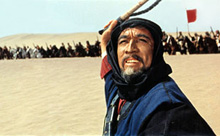 In a far country, Abraham learned that his nephew Lot had been taken captive. He gathered together his allies and waged war against the enemy armies, forcing their kings to surrender. Lot and the other hostages were returned to Sodom and the people's possessions were restored. Although the record states that Abraham did not take any reward for himself, those who were with him "took their share" of the riches that had been recovered (Gen 14:24).
In a far country, Abraham learned that his nephew Lot had been taken captive. He gathered together his allies and waged war against the enemy armies, forcing their kings to surrender. Lot and the other hostages were returned to Sodom and the people's possessions were restored. Although the record states that Abraham did not take any reward for himself, those who were with him "took their share" of the riches that had been recovered (Gen 14:24).
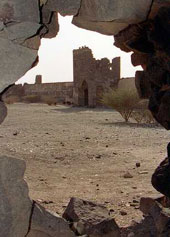
The war had been costly. Many soldiers had been killed, families had been displaced, lives disrupted, crops destroyed, buildings burned down, possessions lost or stolen. Things would never be the same.
Sodom had been a haven of peace and abundance; a pleasant expanse of orchards and rich farms providing plentiful food and fabrics. Now many things were in short supply and prices went through the roof. Traders and merchants demanded huge sums for grain and ale, lenders charged exorbitant interest rates. The rich got richer and the poor got poorer.
And no one believed they were safe from enemy attack. They didn't trust their allies and had no faith in the king. Everyone was angry and afraid.
This was the town that the two strangers came to visit.
Not One of Us
We need to remember, too, that Lot and his family were immigrants to the city — wealthy immigrants who had only lived in Sodom for a few years. They probably had a nice house in a good part of town, for Lot brought with him the many herds and servants he had accumulated while living with Abraham. (Not to mention that his uncle was a warrior king!)
And now, after all they've been through, the people of Sodom see this rich foreigner in conversation with a couple of strangers. He treats them with obvious deference and then escorts them to his house — so they must be important somebodies. But who are they?
Surely someone went in for a closer look or perhaps a neighbor reported what she saw.
 "There they were, sitting together around the table, thick as thieves, dining on dates and honey and other delicacies. — While decent people who have lived here all their lives are going hungry! It's a scandal!"
"There they were, sitting together around the table, thick as thieves, dining on dates and honey and other delicacies. — While decent people who have lived here all their lives are going hungry! It's a scandal!"
"Eating and drinking and laughing... saying God-only-knows-what in that unintelligible language of theirs! — They sound like a bunch of magpies chattering together!"
"No one ever knows what is going on in that house. They keep to themselves." — "I guess they are too good to have anything to do with plain folks like us!" — "No one can understand them, anyway. He has that ridiculous accent, and the wife and daughters go chitter-chatter to one another all day long." — "If they're going to live here, why don't they learn to speak our language?"
"They don't need to; not with all the wealth they've got! Flocks and flocks of goats and sheep, teams of shepherds, servants in every room in the house ... they've probably got a storeroom full of gold and jewels." — "Maybe that's why no one has ever been in that house!"
"How did he get to be so rich? He doesn't do anything." — "While the rest of us slave away all our lives, these rich foreigners come here and make themselves comfortable!"
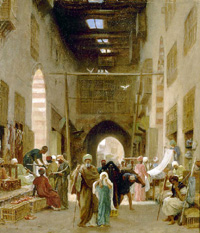
"He spends all his time just sitting by the gate and watching the people pass by." — "Nice work, if you can get it!" — "Lazy, good-for-nothing foreigner!"
"Why does he sit there anyway — when there are lots of other nice shady spots in town? He must be up to something!" "He shouldn't even be there — that's the main entrance to the city! It should be guarded by natives of Sodom that we can trust — not that damned foreigner, gabbing with anybody who comes along."
"He's hardly trustworthy, is he? After all, he isn't really one of us."
"We were lucky last time, because it was in his interest to help us: we were on the same side. But what if his uncle the warlord decides to attack our city? He had no trouble beating the armies that beat us ... it would be a cakewalk for him to come in here and take over!"
"Do you suppose that's what they're doing over there right now — plotting to attack us? — He's probably telling those spies where our defenses are weakest!"
"Well, we can't just sit here! We have to know who the hell those guys are and what they want. If they won't talk we'll shake it out of them!"
It Begins
And so a crowd forms, intent on their purpose. They will get to know everything about these strangers who have come into town, by whatever means necessary. Beatings. Rape. Torture. ... Whatever it takes to get a confession. After all: they're not one of us.
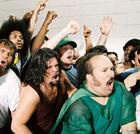 The writer tell us that the mob that arrived on Lot's doorstep was composed of all the people of Sodom — "to the last man." While this is surely an exaggeration, it makes it clear that the hostile attitude toward these unknown visitors was widely held. It was shared by "the great and the small": the big shots in town and the common folk, the rich and the poor, the aristocracy and the peasants — everyone was ready to violently attack the strangers.
The writer tell us that the mob that arrived on Lot's doorstep was composed of all the people of Sodom — "to the last man." While this is surely an exaggeration, it makes it clear that the hostile attitude toward these unknown visitors was widely held. It was shared by "the great and the small": the big shots in town and the common folk, the rich and the poor, the aristocracy and the peasants — everyone was ready to violently attack the strangers.
How could that happen — that a whole community was willing to attack a group of people about whom they knew nothing?
How could the voice of reason — and, more important, the Voice of God — be silenced so utterly?
The answer, I think, is fear.
When we are afraid, we react: fight or flight seem our only alternatives. God gets pushed aside and forgotten. We ignore our Call to be compassionate, we dismiss the Commandment to love. We forget that we are Christians.
When rage and violence begin to swirl around us, we must love all the more passionately. We must counteract demands for vengeance with an insistence on mercy, compassion, and prayer-filled reflection. When abuse and condemnation is hurled at "foreigners" — at "outsiders" of every kind, let us recall the sin of Sodom.
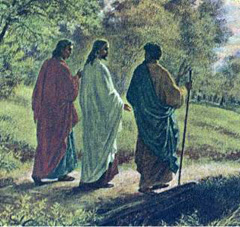
The only reason for the people of Sodom's attack on Lot and his visitors was fear — fear of those about whom they knew nothing. It certainly wasn't sexual attraction. Their fear drove them to be willing to do anything: to assault a man in his home, to attack a visitor, to drive out a stranger, to kill a messenger of the living God.
Fear, suspicion, hatred, prejudice ... those are sins which will destroy a city — or a nation, or a soul.
Questions to consider
What are you afraid of? How do you respond when something frightens you? What can you do to bring Christ-inspired wisdom and peace into your life and into our world?